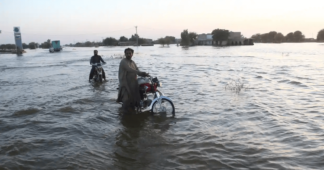Fears of ‘big regression’ in climate action that could spread across Europe if National Rally gains power
By Ajit Niranjan
European environment correspondent
Wed 3 Jul 2024
A victory for the far right in the French elections could deal a serious blow to climate policy in France, experts have warned, with consequences that could ripple through the European Union and beyond.
The second round of snap polls, whichEmmanuel Macron called after the National Rally (RN) scored big gains in European elections last month, could result in Marine Le Pen’s party securing a majority in the French parliament on Sunday, although nationwide efforts to form a “republican front” may prevent that.
Climate action has barely featured in the election campaign but RN plans to roll back some policies if it wins power. The party has ridden a wave of anger at green measures unleashed during farmers’ protests this year and decried what it calls “punitive ecology”. It has has indicated it wants to overturn a 2035 ban on combustion engine cars, block new wind turbines, scrap low-emissions zones and rip up rules on energy efficiency.
“It’s going to be a big regression, at least for climate policy,” said Christophe Cassou, research director at the French National Centre for Scientific Research.
France is the EU’s third-biggest polluter of planet-heating gases. Although per person the French emit less than the continental average – a large nuclear fleet means its electricity grid is less carbon intensive that its neighbours – French farms, roads and buildings remain big sources of pollution that the government has struggled to clean up.
Part of its reluctance has come from resistance at home. Huge protests from the gilet jaune (yellow vest) movement rocked the country in 2018. Explosive anger at fuel prices and inequality was fired up by a carbon tax on petrol that Macron tried to introduce after having partially abolished a wealth tax.
Political scientists see limited evidence of a backlash to costly climate action driving far-right support in countries such as France and Germany. A more likely explanation, they say, is that the environment has fallen down voters’ priority lists and issues such as migration and inflation have shot up. The French Greens saw their vote share plummet from 13% to 5% at the European elections, while RN’s rose to 31% – capturing nearly one in every three voters.
Continue reading at www.theguardian.com/
We remind our readers that publication of articles on our site does not mean that we agree with what is written. Our policy is to publish anything which we consider of interest, so as to assist our readers in forming their opinions. Sometimes we even publish articles with which we totally disagree, since we believe it is important for our readers to be informed on as wide a spectrum of views as possible.











